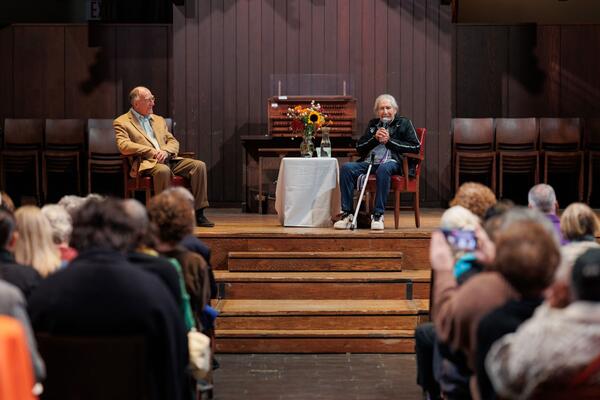October 24, 2024

Today in the blog, we have a guest post from our associate Sam King, reporting out on the amazing Thomas Berry Award presentation held at Union Theological Seminary last week. See the full video of the event at the end of this post, and go here to see galleries of photos taken during and after the ceremony. Read more about the event at the Center for Earth Ethics blog.
On Indigenous Peoples’ Day, Chief Oren Lyons was granted the Thomas Berry Award at Union Theological Seminary on the ancestral homeland of the Lenape people.
Oren Lyons is a Faithkeeper of the Turtle Clan of the Onondaga Nation and a Chief of the Onondaga Nation Council of Chiefs of the Six Nations of the Iroquois Confederacy, the Haudenosaunee. A former All-American lacrosse player at Syracuse, Lyons played a major role in reviving the Native sport before becoming a Professor of American Studies at State University of New York-Buffalo, and a leading voice internationally on Indigenous rights and Earth ethics.
The Thomas Berry Award is conferred by the Thomas Berry Foundation to individuals who exemplify the ideas of the “Great Work” in their teachings, writings, and public service. Berry defines the “Great Work” as “the transition from a period of human devastation of the Earth to a period when humans would be present to the planet in a mutually beneficial manner.”
In her opening remarks, Union President Rev. Serene Jones offered a Land Acknowledgement and thanked Chief Lyons for his “tireless and courageous work to advance justice for Indigenous communities and for the environment over the course of an incredible lifetime.”
Karenna Gore, Executive Director of the Center for Earth Ethics, followed by reflecting on the emerging field of religion and ecology, the enduring legacy of Thomas Berry, and the 2014 Religions for the Earth Conference, held at Union before the UN Climate Change Conference in Paris (COP21), where Chief Lyons repeated his prescient call to action with “gravitas and clarity.”

After a brief introduction from Mary Evelyn Tucker, Paul Winter offered a moving rendition of “Sun Singer,” drawn from his Grammy Award-winning repertoire of Earth music.
In her introductory remarks, Mary Evelyn Tucker highlighted some memorable achievements from Chief Lyons’ life journey – from championing the United Nations Declaration on the Rights of Indigenous Peoples to becoming the first Native person to speak at Harvard Divinity School, in 1997, for the Indigenous Religions and Ecology conference, calling his remarks “incisive, deep, and spiritually grounded.” Tucker recalled being present with Thomas Berry at the the Millennium Summit of the United Nations in 2000, at which Chief Lyons shared his prophetic words that “the ice is melting.”
Tucker also affirmed the longstanding friendship between Chief Lyons and Thomas Berry, reading from Berry’s unpublished autobiography, Goldenrod, in which Berry describes Lyons as someone, “whose presence also has that remarkable quality of personal grandeur that I would associate with Shakespeare where he says of someone that all nature could stand up and say here is a man. As a model for what a human being might be, Oren Lyons would undoubtedly be one of the persons who would come into my mind immediately” (Goldenrod, 93; Thomas Berry: A Biography, 242).

Addressing Chief Lyons by his Haudenosaunee name, Joagquisho, John Grim described the opening Land Acknowledgement as “alive, living in us,” and affirmed that: “you’ve given us the strength to push it out; words on the ground.”
He recounted Chief Lyons’ memorable visit to Bucknell University to dedicate the artist Frederick Franck’s sculpture, Seven Generations, before asking the audience: “What does it mean to have a leader among us who gives us a sense of pointing out a way forward?”
Grim proceeded to read the award dedication:
“The Thomas Berry Foundation presents the Thomas Berry Award to Joagquisho, Oren Lyons, Faithkeeper, Onondaga Nation, Haudonausaunee, Sixth Nations Iroquois Confederacy, in recognition for his lifelong dedication to the flourishing of the Earth Community. His clarion call to respond to the world as teacher and kin has been heard on every continent.”
After a standing ovation, Chief Lyons reflected on a childhood of hunting, fishing, and swimming on Onondaga Land, in a matrilineal society, before moving to New York City as a young artist, and becoming a “runner” for the Iroquois Confederacy–and for Indigenous communities around the world. He concluded the event by reading his speech from the UN Millennium Summit in 2000:
“Leaders of the World,
There can be no peace as long as we wage war upon Our Mother, The Earth. Responsible and courageous actions must be taken to realign ourselves with the great laws of nature. We must meet this crisis now, while we still have time. We offer these words as common peoples in support of peace, equity, justice, and reconciliation.
As we speak, the ice continues to melt in the north. Dahnato (now I am finished). Neyawenha (thank you).”
Watch the full recording of the event below:
